Mitsui O.S.K. Lines, Ltd. (MOL) and Kobe Steel, Ltd. on Thursday (Mar09) announced that the companies have offset carbon dioxide (CO2) emissions from fuel used in ocean transport of iron ore from Australia to Japan, through the use of voluntary carbon credits (Note 1) generated from the Rimba Raya Biodiversity Reserve project in Indonesia.

Both companies believe optimal and effective approaches to reduce CO2 emissions throughout the supply chain are essential to realize a sustainable society. While MOL seeks co-creation with other companies on measures that the company can take now to achieve the target of net zero greenhouse gas (GHG) emissions by 2050, Kobe Steel, which set "Contributing to a green society" as its Group's materiality, agrees with the idea. This has led the companies to team up on this carbon offset.
The offsetting took place for the Capesize bulker under MOL's operation, Shinzan Maru (Note 2), which is exclusively engaged in a long-term iron ore transport contract with Kobe Steel. The voyage took about six weeks from Port Walcott, Australia, to Kakogawa Works in Kakogawa City, Hyogo Prefecture, where the iron ore was unloaded. The CO2 emissions from the Shinzan Maru during this period were calculated to be about 2,875 tons for the entire process from fuel oil production to consumption on the vessel. (Note 3)
The carbon credits used for this carbon offset have been certified by Verra, which operates the world's leading voluntary carbon credit standards, and generated within the past five years. In addition, the Rimba Raya Biodiversity Reserve project contributes not only to CO2 emission reductions, but also to co-benefits such as biodiversity conservation and job creation for local communities.
MOL and Kobe Steel hope to use this opportunity to accelerate co-creation with various stakeholders with the aim of effectively reducing CO2 emissions throughout the supply chain and contributing to society.
(Note 1) Carbon credits used for this carbon offset
| Project name | Rimba Raya Biodiversity Reserve Project |
| Nation/Region | Indonesia |
| Credit Amount | 2,933 tons (Credits equivalent to 102% emissions were retired in accordance with certification rules) |
| Credit generation year | 2018 |
| Credit type | Agriculture Forestry and Other Land Use (REDD+) |
| Certification program | Verified Carbon Standard |
| Certification organization | Verra Verra is an international carbon credit standard management organization headquartered in Washington, D.C., U.S. It certifies emission reductions and removals from climate change activities and issues them as credits, and manages and certifies the Verified Carbon Standard (VCS), a certification scheme to have them issued as credits. VCS is the most widely used such program in the world and is used by private companies and others. |
| Outline | A project to protect peat swamp forests in Kalimantan, Indonesia, an island rich in biodiversity. The project has also received the highest level of Gold in the Climate Community & Biodiversity Standard (CCB) certification, and obtained SD VISta certification (Sustainable Development Verified Impact Standard), which certifies its contribution to United Nations Sustainable Development Goals (SDGs) in all 17 categories. |
(Note 2) Shinzan Maru Specifications:
- Shipyard: Hiroshima Shipyard, Imabari Shipbuilding Co., Ltd.
- Delivery year: 2016
- Deadweight tons: 215,790 tons
- Length: 319.95 m
- Breadth: 55.00 m
- Full load draft: 16.25 m
- Outline of the vessel: The current Shinzan Maru is the third-generation vessel carrying that name and has played a role in transporting raw materials as part of the core fleet serving Kobe Steel since the days of Yamashita-Shinnihon Steamship Co., Ltd., one of MOL's predecessors. The traditional name of the vessel has been passed down from the first generation, completed in 1968, through the second generation, completed in 1987, to the vessel now in service.
(Note 3) Based on a survey conducted by Bureau Veritas, a third-party certification body headquartered in Paris, France. The entire process from the calculation of CO2 emissions, including the verification process, to the offsetting of CO2 emissions through carbon credits is also conducted by a third-party certification body, Climate Neutral Commodity (Headquartered in Geneva, Switzerland. It provides certification services for carbon neutral products and transactions, as well as advisory services related to these products and transactions).